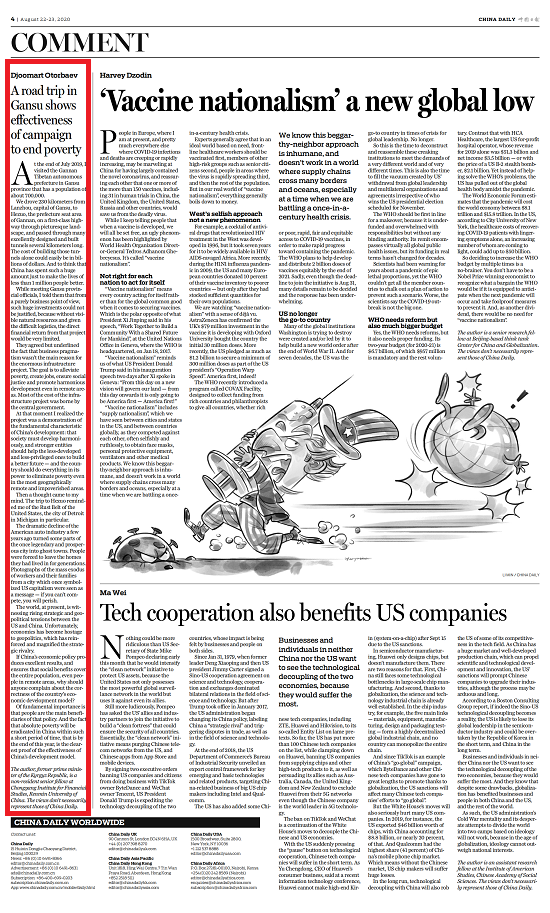Global Governance
Your Present Location: PROGRAMS> Global GovernanceDjoomart Otorbaev: A road trip in Gansu shows effectiveness of campaign to end poverty
By Djoomart Otorbaev Source: China Daily Published: 2020-08-22
At the end of July 2019, I visited the Gannan Tibetan autonomous prefecture in Gansu province that has a population of about 700,000.
We drove 230 kilometers from Lanzhou, capital of Gansu, to Hezuo, the prefecture seat area of Gannan, on a first-class highway through picturesque landscape, and passed through many excellently designed and built tunnels several kilometers long. The cost of building those tunnels alone could easily be in billions of dollars. And to think that China has spent such a huge amount just to make the lives of less than 1 million people better.

While meeting Gansu provincial officials, I told them that from a purely business point of view, such huge investments could not be justified, because without visible natural resources and given the difficult logistics, the direct financial return from that project would be very limited.
They agreed but underlined the fact that business pragmatism wasn't the main reason for the enormous infrastructure project. The goal is to alleviate poverty, create jobs, ensure social justice and promote harmonious development even in remote areas. Most of the cost of the infrastructure project was borne by the central government.
At that moment I realized the project was a demonstration of the fundamental characteristic of China's development: that society must develop harmoniously, and stronger entities should help the less-developed and less-privileged ones to build a better future-and the country should do everything in its power to eliminate poverty even in the most geographically remote and impoverished areas.
Then a thought came to my mind. The trip to Hezuo reminded me of the Rust Belt of the United States, the city of Detroit in Michigan in particular.
The dramatic decline of the American auto industry a few years ago turned some parts of the once legendary and prosperous city into ghost towns. People were forced to leave the homes they had lived in for generations. Photographs of the mass exodus of workers and their families from a city which once symbolized US capitalism were seen as a message-if you can't compete, you will perish.
The world, at present, is witnessing rising strategic and geopolitical tensions between the US and China. Unfortunately, economics has become hostage to geopolitics, which has reinforced and magnified the strategic rivalry.
If China's economic policy produces excellent results, and ensures that social benefits cover the entire population, even people in remote areas, why should anyone complain about the correctness of the country's economic development model?
Of fundamental importance is that people are the main beneficiaries of that policy. And the fact that absolute poverty will be eradicated in China within such a short period of time, that is by the end of this year, is the clearest proof of the effectiveness of China's development model.
Djoomart Otorbaev is former prime minister of Kyrgyzstan and now a non-resdient senior researcher at Chongyang Institution for Financial Studies at Renmin University of China.























































































 京公网安备 11010802037854号
京公网安备 11010802037854号





